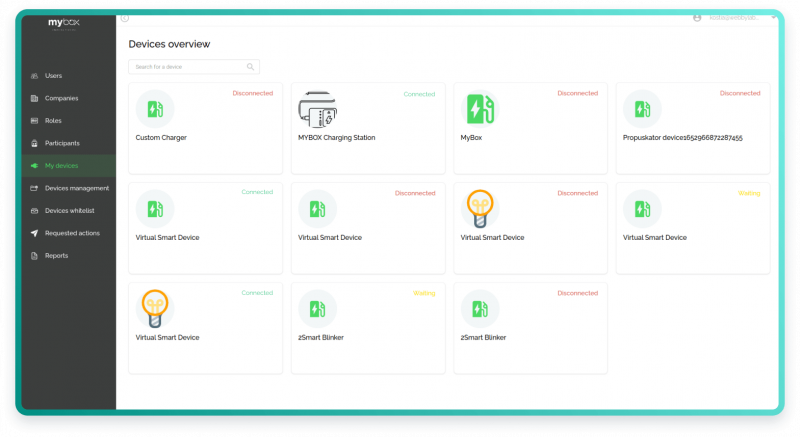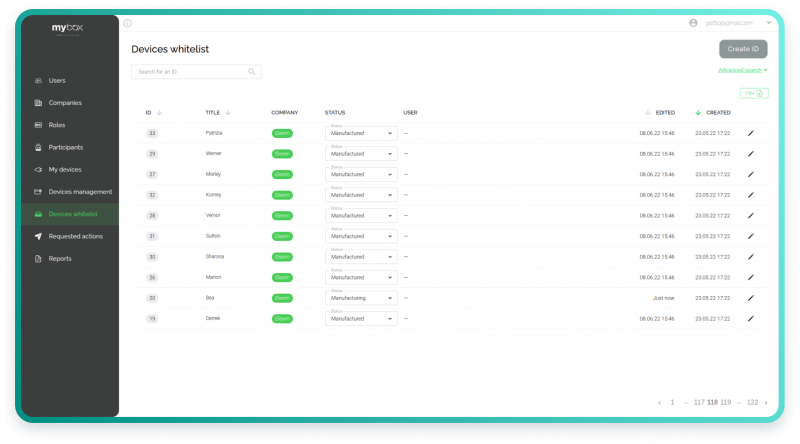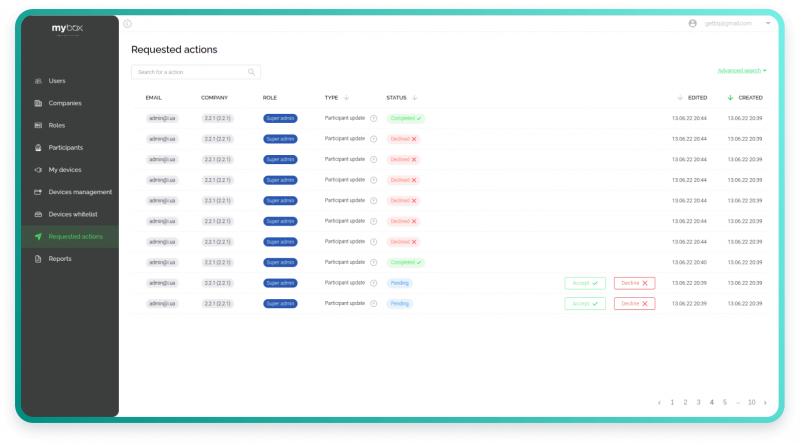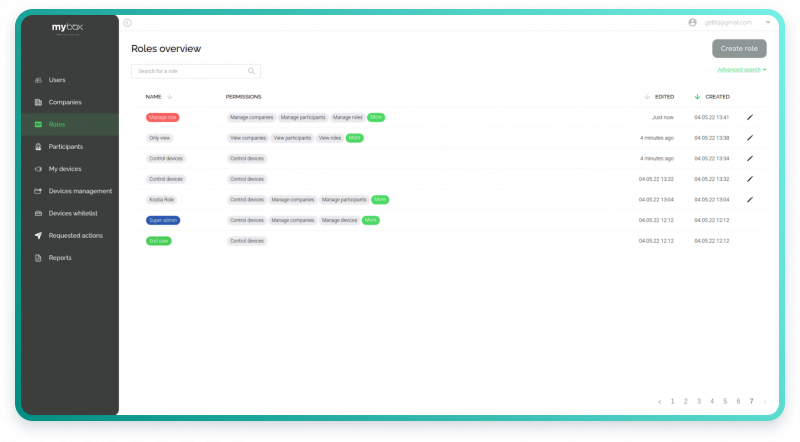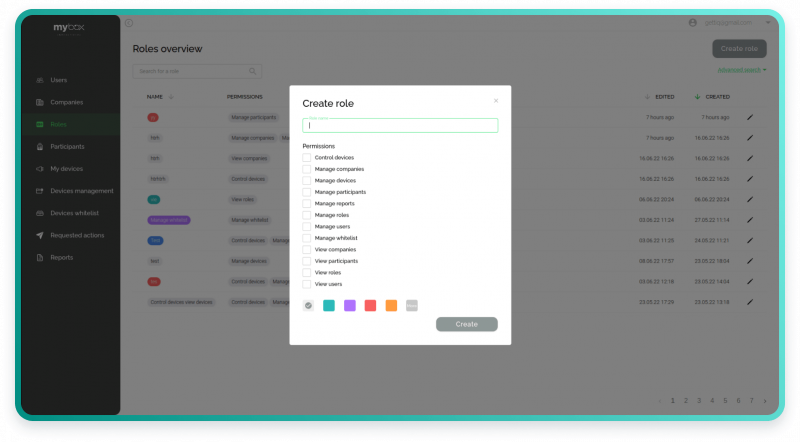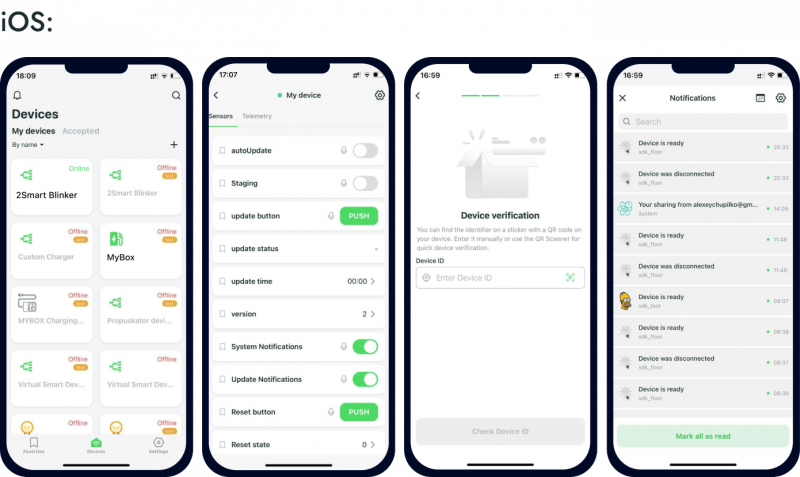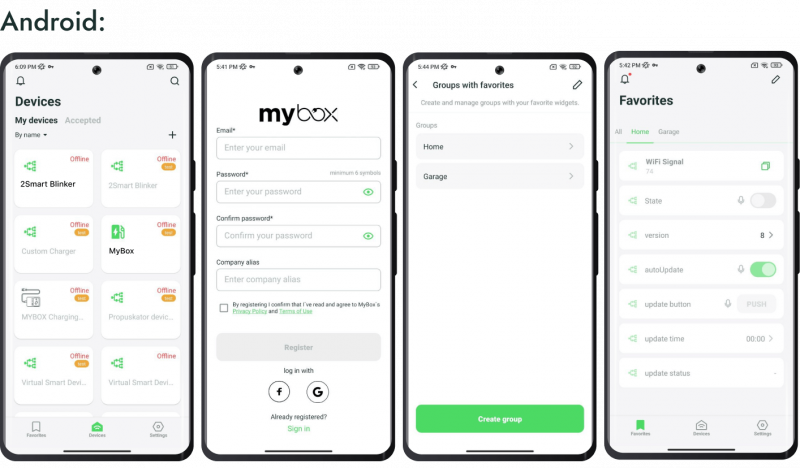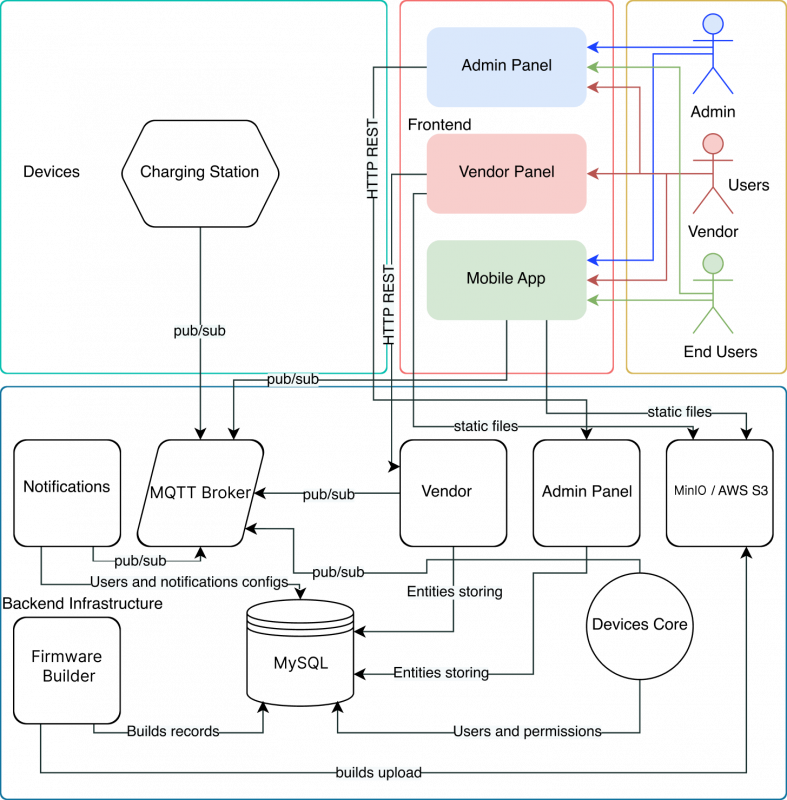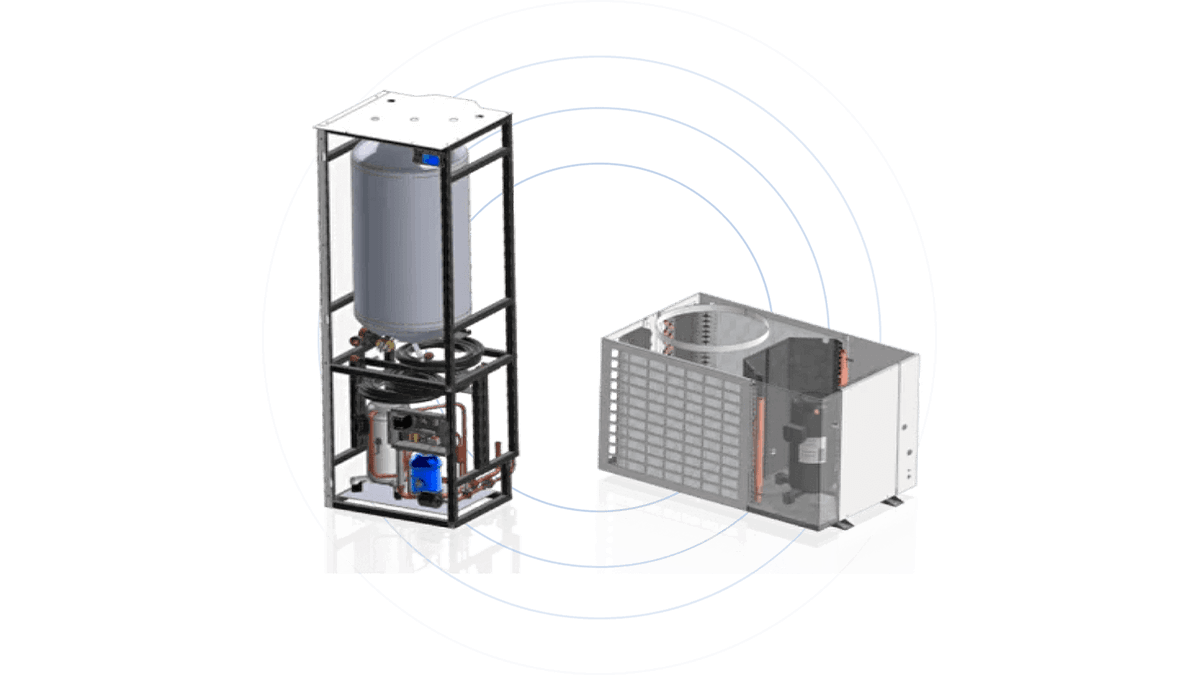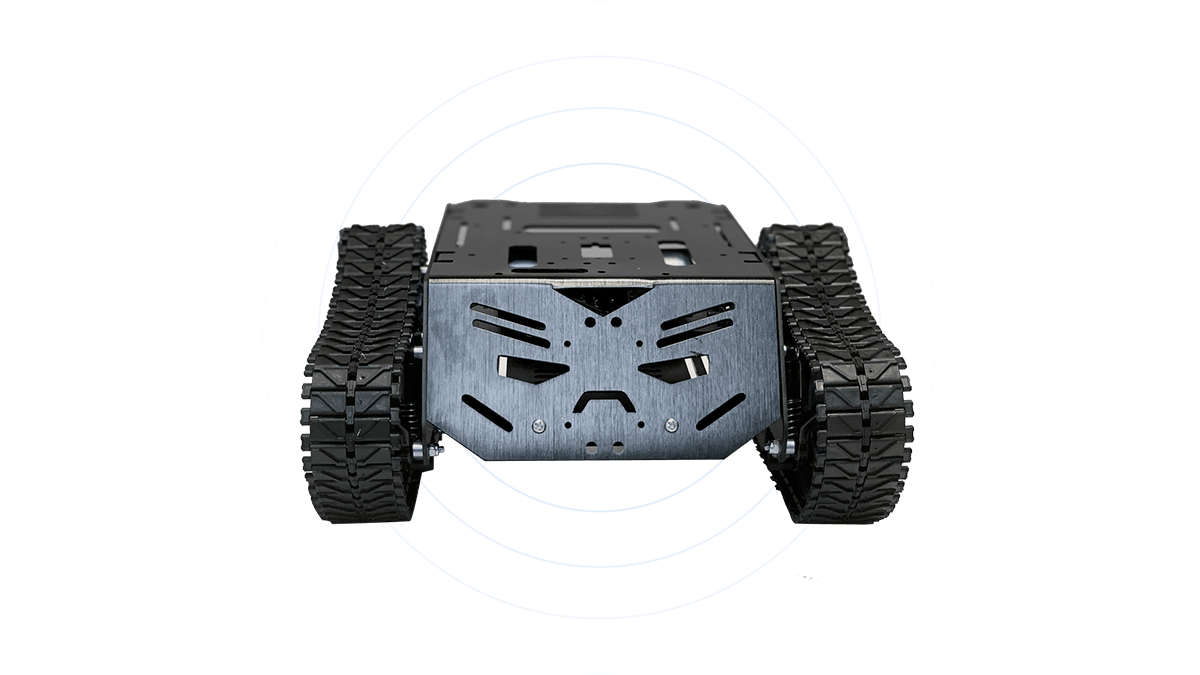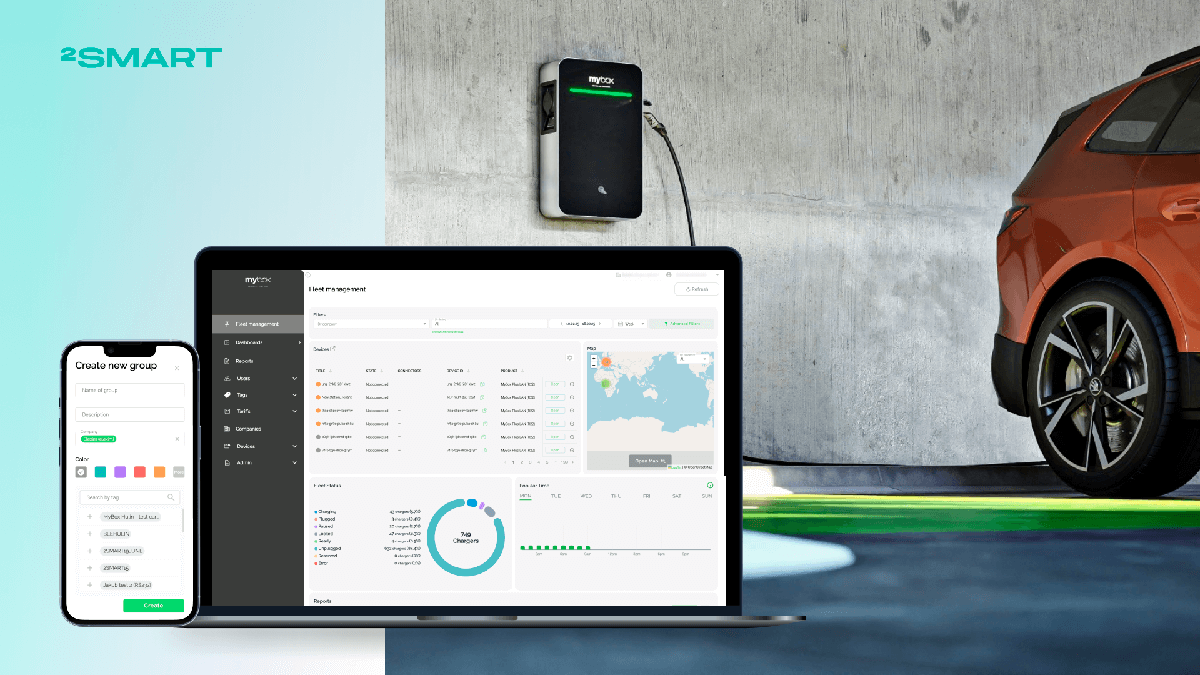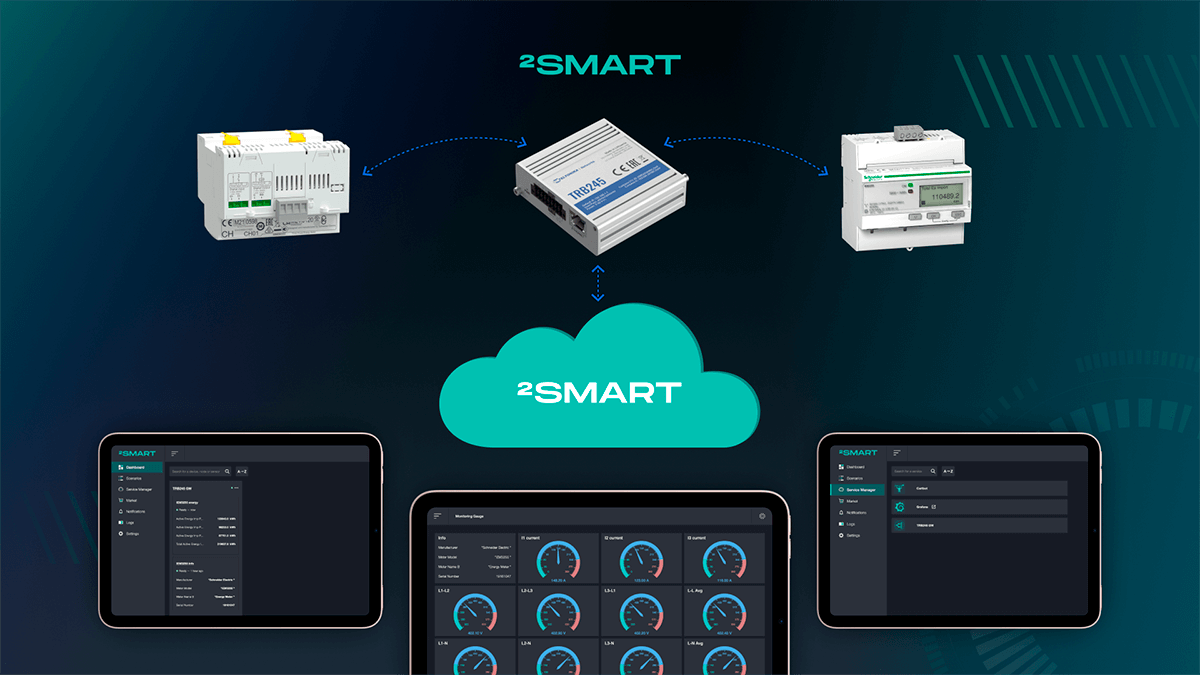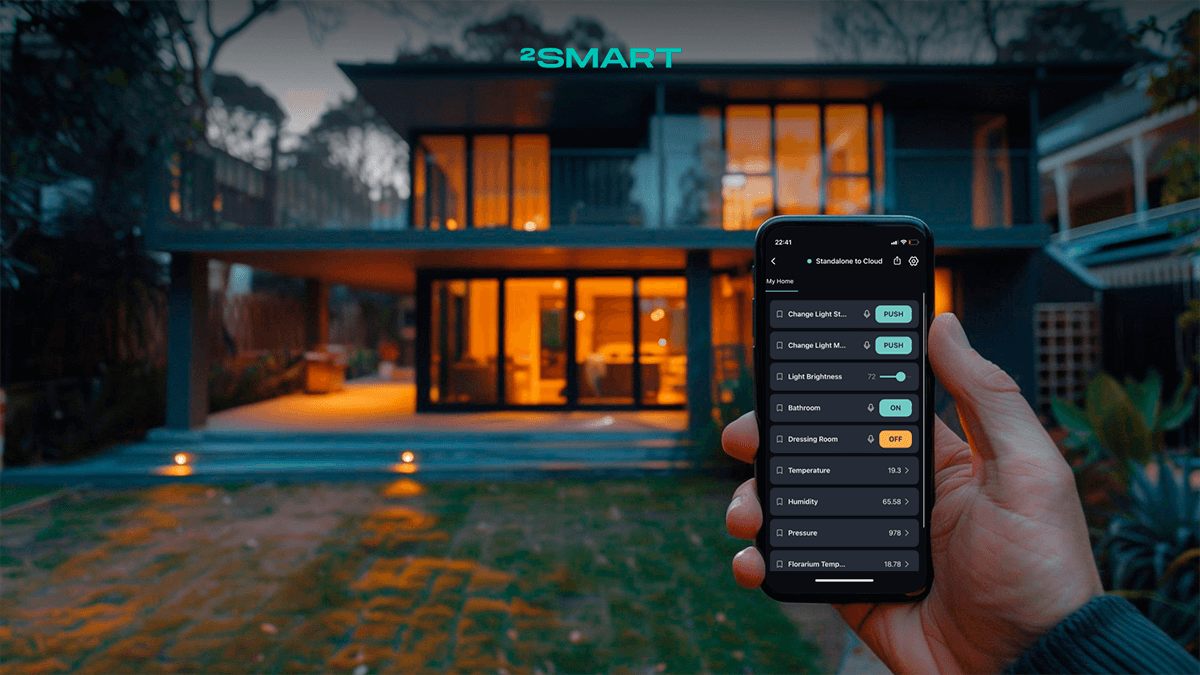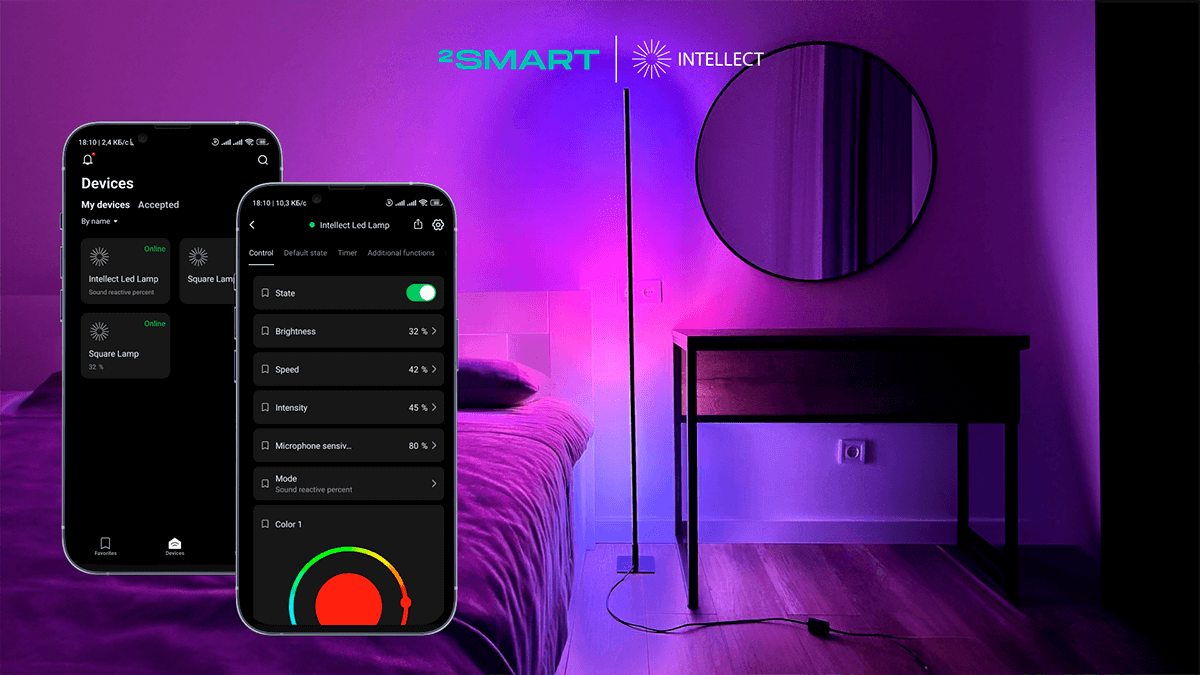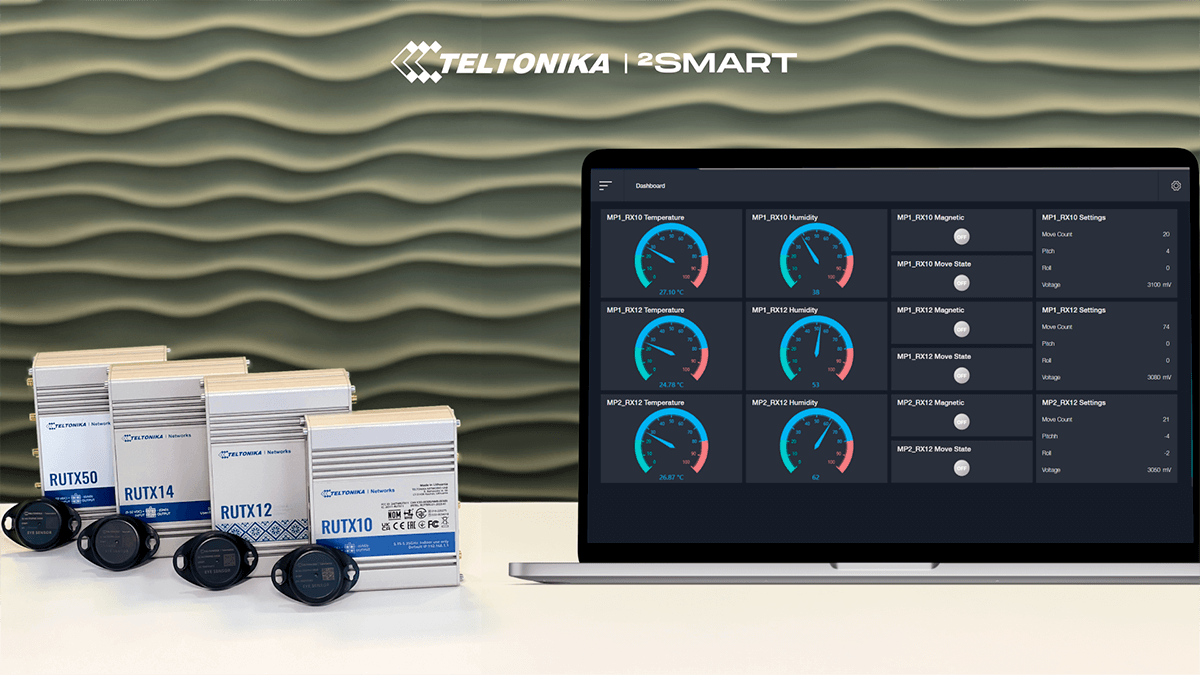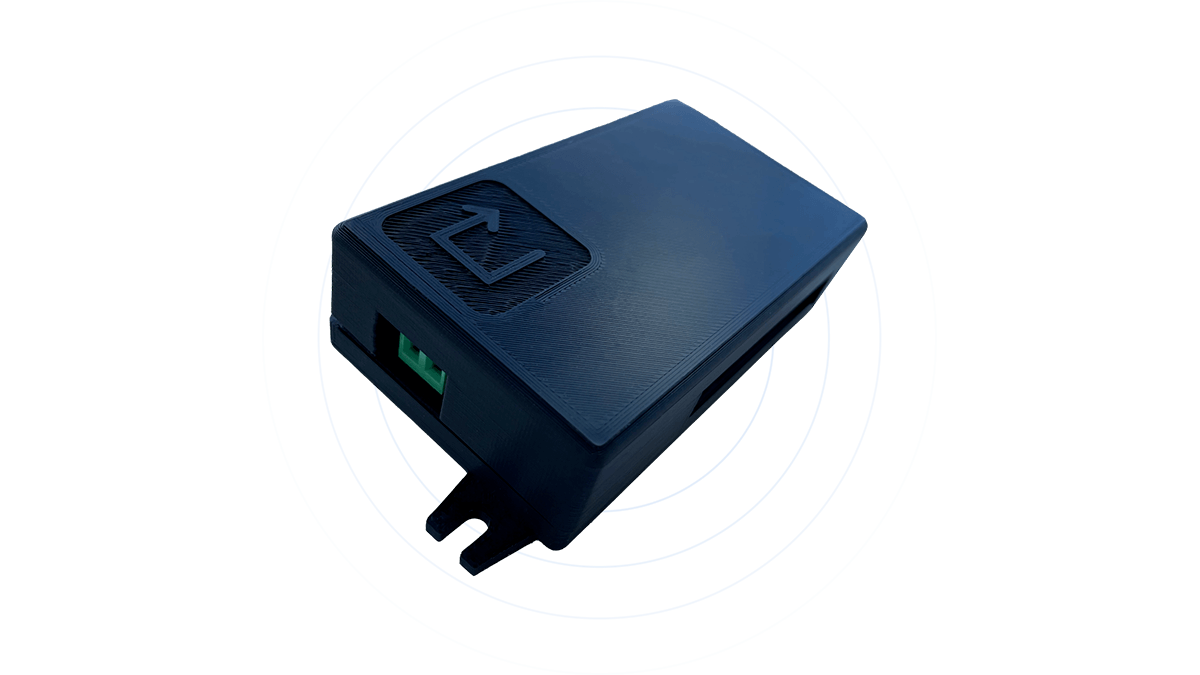Table of contents:
Project details
Stage one
Timeframe
Estimate – 12 weeks
Actual delivery – 11.5 weeks
Stage two
Timeframe
Estimate – 14 weeks
Actual delivery – ongoing
Industry
IoT, EV
Services
- Business analysis
- R&D
- Architecture design
- Front-end development
- Back-end development
- Firmware development
- QA
The brief
MyBox is an enterprise manufacturer and supplier of EV charging stations from Eastern Europe. The company provides in-depth expertise in industrial electrical equipment. But to deliver the market-ready product, they needed backend cloud infrastructure for operators and support teams, with mobile applications for end-users. That is, a full-fledged cloud platform for EV charging management.
So MyBox representatives contacted us to provide the EV charging software and custom integration with their existing proprietary system.
Challenge
The most critical business challenge was developing a universal cloud-based EV charging management platform to remotely connect, configure, and support thousands of EV chargers with different hardware and user charging behaviour.
The second part of the challenge was ensuring enterprise-grade security while keeping everything user-friendly on both sides of the vendor and the end-users.
The last part of the business challenge was finding a single solution provider with expertise in custom cloud software, IoT hardware, firmware, and mobile applications development.
The main technical challenge was to reuse the existing 2Smart Cloud functionality as much as possible to quickly and cost-effectively solve the presented problems.
At the same time, it was necessary to develop new features to address the tasks in flexible differentiation of administrators of different levels and ensure future scalability.
Solution
To tackle these challenges, we used the functionality of the 2Smart Cloud platform as a framework and developed a set of custom features on top of it:
Reused platform features:
- MQTT Broker for managing devices.
- Collecting of time series data.
- Ability to monitor the status of the chargers.
- Statistics gathering for connected devices and online users.
- Versioning of the firmware.
- OTA updates support.
- Health monitoring of the platform itself.
- Integrations with Google Home, iOS shortcuts, messengers, and phone call control.
- Encrypted backups.
- Push notifications in mobile apps and service notifications in cloud app.
Custom developed features:
- Developed a web admin panel as business part of the EV charging management platform. It allows custom visualizations of telemetry, different levels of remote control, debugging, and configuration capabilities over connected charging stations, using our custom UI library.
- Added flexible permission management.
- Implemented additional authentications for matching enterprise security demands.
- Developed single super-versatile firmware to ensure easy interconnection between different hardware.
- Provided iOS and Android white-labeled mobile applications based on the 2Smart Cloud app.
1. Custom web admin panel and telemetry visualizations
We developed a custom web admin panel for the cloud platform for EV charging management. It allows admins of different levels to remotely control, debug and configure thousands of connected charging stations. In addition, it provides custom reports of charging sessions for billing and allows flexible permission management.
2. Permission management
To address this task, we proposed an approach of creating a permissions list that could be separately assigned to different level users directly from the cloud web application.
While refining this feature, we reused user management features from the ACS we developed earlier to avoid code duplication and cut delivery times.
3. Firmware development
Addressing the task of future scalability of the platform in the EV market, we faced two significant technical difficulties while developing a universal firmware:
- Every firmware parameter such as sensor telemetry, wi-fi network credentials, ethernet settings, and connection statuses, along with others, should be a unified entity. For this entity, it is necessary to configure read/write access rights through the cloud-based web application.
In addition, a protocol must be specified for each parameter to receive data. Suppose the temperature sensors operate via various protocols such as the i2c or Modbus. In that case, choosing a protocol should be configurable to ensure the flexibility needed for further scaling by connecting different hardware.
To solve this problem, we devised a universal structure that allows administrators of the EV station charging management platform to declare and configure various firmware parameters with the capability of adding new protocols.
- It was necessary to establish interaction between devices on the one-to-many principle, also known as Master/Slaves since the final devices combine a different number of MCUs. The master entity is responsible for communicating with the cloud and managing Slave devices.
During the development process, we faced an unobvious problem in the incompatibility of the esp32 chip working with i2c in slave mode. To uncover the origins of the issue, we debugged at the lowest level, analyzing the output signals from the MCU.
To solve the problem, we proposed using the esp32-c3 chip in the final product since this problem is fixed at the hardware level in the new generation chips.
4. Ensuring security
To ensure enterprise-grade security, we implemented a form of additional authentication for the devices to restrict unauthorized connections into the Charging Point Management System (CPMS).
We proposed a classical approach of creating a white list. A specific set of privileges attaches to each device (MCU) in the system, with the supervision and final approval from the administrator, allowing them to perform only actions that are explicitly allowed to a particular subject.
Each device uses unique IDs for authentication that integrate on the hardware level in the production stage. As mentioned above, the market-ready devices will consist of several MCUs communicating via I2C in the Master/Slave model.
Slave modules work as a black box and don’t have access to any sensitive information, while the Master module is in charge of communicating with the cloud and stores sensitive data in the encrypted flash.
So, it is impossible to connect to the CPMS without knowing a set of hardware-specific IDs and the I2C API routes between MCUs.
5. Telemetry gathering
Collecting and analyzing telemetry from connected devices is an inherent part of IoT, and our case of the cloud platform to manage electric vehicle charging is no exception.
So our solution allows gathering all the essential telemetry from the dozen sensors inside electric vehicle charging stations, such as active charging session times, electrical parameters of dynamic load, energy consumption and delivery, current, voltage, and temperatures.
All parameters are stored as historical data allowing retrospective analysis for future product enhancements. In addition, we are developing a custom visualization module for analysis simplification as part of the second stage.
6. Mobile applications
We provided white-labeled iOS and Android mobile applications based on the 2Smart Cloud mobile app, which allowed us to deliver market-ready applications in less than a month. We refined the design, reused most of the existing functionality, and developed new features, such as device verification by the QR codes, additional authentication mechanisms to ensure security demands, and custom widgets to match the desired flow of EV charging operations for the end-users.
Solution architecture features
The magic of our solution is in utilizing a microservice architecture based on Docker containers with configuration via environment variables.
It allows the reuse of all existing 2Smart Cloud modules and functionality flexibly for cost-effective and rapid development. Also, it provides the capability of relatively simple addition of new custom modules in the form of new microservices to the cloud-based platform for EV charge point management.
Key features
Implemented features in Stage One:
- White-label IoT solutions, namely mobile applications for EV charging stations under the customer’s brand.
- Cloud web panel (enterprise IoT device management platform) for remote administration of thousands of EV chargers, with flexible multi-layer permissions management.
- Remote updates and configuration functionality to ensure remote support.
- Remote telemetry gathering of EV charging systems process.
- Ensured future scalability with the help of universal firmware that handles hardware from different vendors.
Features to be implemented in Stage Two:
- Generating custom reports for admins and consumers.
- Implementing a billing gateway for the public usage of the smart charge.
- Developing the user flow for unregistered users to use public chargers without hassle.
- Developing custom mobile app widgets for in-depth configuration of connected devices.
- Developing a custom integration for third-party charging stations for connecting them to the system without refining the firmware of each charger.
- Implementing an OCPP technology for connecting third-party devices to the existing EV station charging management platform.
Results
- Developed an enterprise-grade cloud EV charging management platform that remotely manages and supports a network of thousands of private and public EV Chargers from different vendors.
- Successfully reused a big part of the platform`s functionality to cut the time to market drastically.
- On top of the existing functionality, we developed features such as advanced user permission management, custom data visualizations, and additional security measures.
- In addition, we developed a custom, super-flexible firmware for the ESP-C3 MCU controlling the chargers that ensures easy future support and scaling.
- Provided modern and comprehensive white-labeled mobile applications for the end-users.
Technologies used throughout the development process
- Front-end: React, Redux, Babel, E-charts, Webpack, Parcel.
- Back-end: NodeJS, Sequelize, Express, MQTT.js.
- Mobile: React Native, Redux, Babel.
- Services: MQTT, NGINX, Mysql, Prometheus, Grafana, Influx, Memcached.
- Integrations: Google Home, IOS Shortcuts, Slack.
- Firmware: Espressif ESP-IDF.
You can also use 2Smart cloud software for turning your ideas within a free plan if you connect up to 20 devices to our platform.
If you require our support with IoT solutions – send us your task description and we will find the best solution for you.
contact@2smart.com
Don't forget to share this post!
Read Next
Let’s dive into your case
Share with us your business idea and expectations about the software or additional services.

